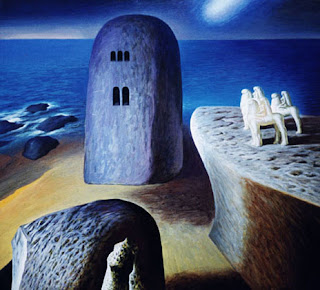Andrei Şerban (born June 21, 1943, Bucharest) is a Romanian-born theater director. A major name in today's theatre, he is renowned for his innovative and iconoclastic interpretations and stagings.

As a child, he was presenting puppet shows at home and staging mock battles with his friends in Bucharest's
Grădina Icoanei. From 1961 to 1968, he studied at the
Theatrical and Cinematographic Art Institute in Bucharest. As a student, he directed
Julius Caesar, which he now calls his "most daring production ever". Set in the Japanese Kabuki style, with a flower bridge built over the audience, and with Caesar's death performed in slow motion created an enormous scandal. After that, it became very hard for him to find a job in Romania.
In 1969, Şerban emigrated to the United States, with the help of Ellen Stewart, and a grant from the Ford Foundation. In 1970, he went to Paris to study at
Peter Brook's International Center for Theatre Research. In 1971, he staged
Medea at La MaMa, E.T.C., the experimental theater club in New York City. Three years later, he directed
Fragments of a Greek Trilogy (Medea, The Trojan Women, and Electra), also at La MaMa. For more than two decades, Şerban has been associated with the
American Repertory Theatre in Cambridge, Massachusetts. At the A.R.T., he has directed
Lysistrata, The Merchant of Venice, The Taming of the Shrew, The King Stag, Sganarelle, Three Sisters, The Juniper Tree, The Miser, Twelfth Night, Sweet Table at the Richelieu, and Pericles. While at Columbia, he has directed the Oscar Hammerstein II Center for Theater Studies, and the M.F.A. Acting program. He has also taught at Yale University, Harvard University, Carnegie Mellon University, Sarah Lawrence College, University of California, San Diego, the Paris Conservatoire d'Art Dramatique and the American Repertory Theatre's Institute for Advanced Theatre Training.

As a director, Şerban has also worked at the Circle in the Square Theatre, the Yale Repertory Theatre, the American Conservatory Theatre, the Metropolitan Opera, the New York City, Seattle and Los Angeles Operas, at the Paris, Geneva, Vienna, and Bologna Opera Houses, the Welsh National Opera, Covent Garden, Théâtre de la Ville, the Comédie Française, Helsinki's Lilla Teatern, and with the Shiki Theater Company in Tokyo. From 1990 to 1993, he headed the National Theatre Bucharest. He has received grants from the Ford, Guggenheim and Rockefeller Foundations. Since 1992, he is Professor of Theatre at the Columbia University School of the Arts. In 2006, he published his autobiography, written in Romanian.
Andrei Şerban is the recipient of the 1974-75 Obie Award for Trilogy. In 1999, he received from the Boston Theater Critics Association the Elliot Norton Award for Sustained Excellence. The same year, he received from the Society of Stage Directors & Choreographers the prestigious George Abbott Award, honoring artists who have made a major impact on theatre in the twentieth-century. Also in 1999, the Romanian National Foundation for Arts and Sciences, together with the Romanian Academy, awarded him the newly-founded Prize for Excellence in Romanian Culture.

























